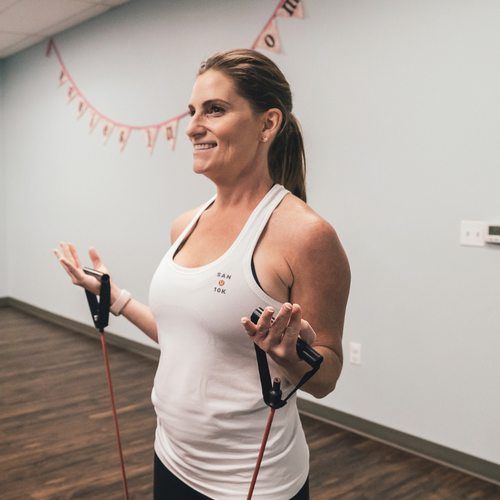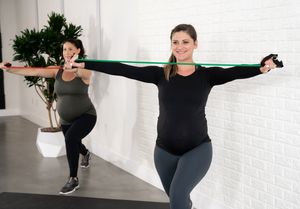
Training By Trimester: 1st Trimester
FIT4MOM x Jessica Maurer
Welcome to your 1st Trimester, mama.
Did you know that most women do not know they are pregnant until the end of their 1st Trimester? Major ‘construction’ is underway during all stages of pregnancy; while some women barely notice significant body changes, others will be hyper-aware and deeply affected! No matter when they find out about their pregnancy, little must change to a woman's fitness routine during her 1st Trimester. Pretty neat, right?
We know that some women feel intimidated or scared of exercising while pregnant—whether they were active prior to pregnancy or not. Our goal is to help reframe exercise for you during this precious time. The focus of exercise during this time should be on maintaining strength, easing the physical challenges of pregnancy, and preparing the body for birth and subsequent recovery.
If you were exercising regularly before getting pregnant, you should be able to continue most of your normal, preferred activities during the 1st Trimester—including intensity, impact, duration, and chosen style of movement. According to the American College of Obstetricians and Gynecologists, some contraindications and considerations can stop a woman from continuing in fitness while pregnant. There are also Urgent Maternal Warning Signs that should encourage a pregnant woman to seek immediate medical attention.
However, exercise should not exceed pre-pregnancy intensity levels. If you exercised at a moderate pace for the majority of your workouts prior to pregnancy, you can continue. If you were not practicing high-intensity interval training prior to pregnancy, you should not start now.
Although you may not look pregnant in your 1st Trimester, your body is going through SO many hormonal and physical changes. You may also be feeling exhilarated, nervous, exhausted, and stressed. Although pregnancy news can be exciting, it can also be emotionally stressful. It's natural to worry about your health, the baby's health, the financial burden of raising a child, and the transition to the next stage of parenthood. All of these emotions are normal and natural. If these emotions rise to a level that makes you worry, please see a healthcare professional as soon as possible.
Remember that the physical and hormonal changes you are experiencing may cause mood swings, tender breasts, nausea, constipation, and more. You may need to adjust your training regimen to continue doing the movements you love safely and effectively.
Let's dive into our Start, Stop, and Continue method for fitness in the 1st Trimester.

START
At FIT4MOM, we encourage training moms for the next step in their motherhood journies. Your belly and breasts are going to grow and pull you forward. This is why you should focus on strengthening your glutes and hips - or what we call the foundation of the body. This foundation will support the canister's growth as the pregnancy develops.
Every day of pregnancy will be different due to the physical changes occurring. We recommend performing a body scan before starting your fitness practice. This way, you are aware of how you feel emotionally and physically and you can determine if this will affect your daily movement choices. Listen to your body and honor it each day. You can still participate in your activities, but they may need to be adjusted to complement how you feel each day.
STOP
Due to pregnancy's hormonal and cardiovascular changes, you may feel dizzy or easily breathless in your 1st Trimester. Stop activities that make you feel weak, nauseous, light-headed, or uncomfortable. At this time, please stop pushing to breathless - even if you worked at that intensity before pregnancy. Due to the increase in progesterone, you may be experiencing breathlessness already, without much intensity or effort.
As a quick reminder, you should not continue any activities where you risk impact with another object, tripping, or falling. When a woman learns she is pregnant, it is highly advised to stop practicing sports that risk the impact of a ball, object, or person, such as MMA, softball, and horseback riding. For the purpose of this blog, we are only speaking to generalized fitness and not sports practices.
The heart rate recommendations for prenatal fitness have been discarded. Instead, you should use the Rate of Perceived Exertion numbers and the talk test to assess your intensity levels. Working with a certified pre and postnatal fitness coach will help you understand these recommendations.
CONTINUE
Yes, you can continue what you were doing at the same duration, intensity, and impact levels as prior to finding out you are pregnant. This means all positions, fitness activities modalities, and equipment.
However, you may feel weaker during this time. You may need to adjust some of the movements to make them feel more appropriate for your current stage of pregnancy.
Do you want more information and guidance? Motherhood is a transformative journey filled with joy, challenges, and the need for incredible strength. Since 2001, FIT4MOM has been the leader of prenatal and postnatal fitness, supporting moms nationwide through our network of franchise owners and dedicated instructors. To further support our mission of helping all moms find their Strength in Motherhood®, we are thrilled to announce our first-ever certification course available to all fitness professionals: FIT4MOM’s Prenatal & Postnatal Fitness Certification.
Let's empower moms to find their Strength in Motherhood® and unlock their full potential for everyday life as a new parent. Motherhood is an extraordinary experience; with FIT4MOM, you can make it even more empowering for your clients.
WANT TO LEARN MORE?
Bringing new life into the world is a miraculous and life-altering experience, but it's no secret that pregnancy and postpartum can bring a whirlwind of changes to a woman's body. As a fitness professional or health enthusiast, you have the power to support and empower mothers on their journey to a healthy pregnancy, a smoother birth experience, and a robust postpartum recovery.
Register here to receive more information for training the female client.
WANT MORE, MAMA?
Other blogs about pregnancy you'll enjoy:





